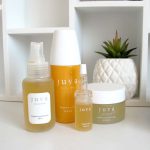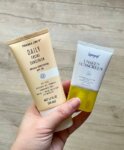Vitamins are amazing for your body, but what do they do when you rub them on your skin? Earlier we looked at vitamin C and what it does – now let’s take a gander at vitamin A, one of the most amazing products for your skin!
Vitamin A is found in vegetables (such as carrots), egg yolk, liver and fish oil. It actually isn’t one compound, but a range of different, related compounds which all act similarly in the body, and are generally referred to as retinoids. There are also some synthetic retinoids which do the same thing too. One of the most widely found retinoids, retinol, is shown below:
Vitamin A has a lot of important functions in the body, including in the eye and the immune system. It’s also important in skin health.
Retinoids have been used since the 1970s for treating acne. It’s mainly used as a cream that’s applied to skin – retinoids used this way include retinoic acid, retinyl palmitate, isotretinoin, tretinoin, retinol and tazarotene. It can also be taken as tablets – the most commonly used is isotretinoin (Roaccutane). Retinoids reduce sebaceous gland size and secretion, and reduces the amount of bacteria in the skin, which is one of the main causes of acne! It suppresses keratinisation – in other words, it reduces the chances of dead skin cells clumping together and causing clogged pores. It also reduces inflammation (redness and swelling).
Creams containing retinoids have also been found to decrease signs of photoageing (sun damage) such as wrinkles, dark spots and roughness. It works mainly by enhancing the rate of skin repair, and increases collagen temporarily – but once you stop using it, the damage can quickly come back!
Rosacea and psoriasis can also be treated with oral retinoids. Taking retinoid tablets has also been shown to slow down the progress of some skin cancers.
However, long term use of retinoids can sometimes result in a lot of unpleasant side effects, and you can even overdose on them! It can dry out your skin completely, cause hair loss and damage your liver. It’s also a teratogen (affects your baby if you’re pregnant), and can give you headaches, nausea, gastrointestinal problems and weak bones. Topical vitamin A is much safer, with irritated and flaky skin (dermatitis) being the main side effect, but in some cases it might not be enough.
One of my favourite skin products, rose hip oil, is full of vitamin A! 🙂
References
K L Keller and N A Fenske. Uses of vitamins A, C, and E and related compounds in dermatology: A review. J Amer Acad Dermatol 1998, 39, 611.
A M Kligman, G L Grove, R Hirose and J J Leyden. Topical tretinoin for photoaged skin. J Amer Acad Dermatol 1986, 15, 836.
S Noble, A J Wagstaff. Tretinoin. A review of its pharmacological properties and clinical efficacy in the topical treatment of photodamaged skin. Drugs Aging 1995, 6, 479.
J H Rabe, A J Mamelak, P J S McElgunn, W L Morison and D N Sauder, Photoaging: Mechanisms and repair. J Amer Acad Dermatol 2006, 55, 1.








Wow! Thanks for another very informative and easy to understand post! Might have to get myself some rose hip oil. 🙂
That stuff works amazingly for me! 🙂
Very interesting, thank you! Reading your blog makes me feel smarter <3
Haha thanks!
Also topical retinoids clear up out of control skin growths, like warts, and there is possible linkage to mood disorders, at least isotretinoin, if taken orally. I wonder if Roaccutane ( formerly Accutane?) changed brand names slightly because of related bad press.
That makes sense, with abnormal keratinisation and all 🙂
I think they did – their reasoning for continuing to prescribe it is that bad acne probably causes more cases of depression, which sounds fair enough to me. You’d think they’d change the name to something without “accutane” in it though!
I had Accutane last year and whereas it cleared up my skin instantly it make me moody and depressed (and I’ve never had a history of depression or mental illness). One I stopped taking, after 15 days I went back to my normal self, it was such a mood swift that I literally felt ecstatic.
Great article! But what about the research saying that retinyl palmiate is potentially toxic? Is there any truth to that?
Also, have you ever tried egg yolk masks? They’re supposed to be full of Vitamin A and I wonder how our skin would fare with regular egg yolk masks..
It potentially generates free radicals when applied to skin that’s then exposed to sunlight – I generally wouldn’t use vitamin A in the daytime anyway, since light often breaks it down!
Egg yolk has 381 μg of vitamin A per 100 g according to Wikipedia – that’s 0.000381%. In terms of diet that’s a lot but in terms of skincare it isn’t much at all. My retinol cream has 1%! Leave-on products also generally deliver more active ingredients than a mask, so I don’t think an egg yolk mask would do much in terms of vitamin A.
Hi! I read that retinyl palmiate is softer/weaker, so probably better for sensitive skin, so we can opt for that retinol as long as we use at night? I don’t have the products you recommend at my country, but I found this ingredient on Eucerin Q10 night cream and it looks like it has only a few other ingredients and look safe for sensitive dry skin, so I was tempted to start a retinol treatment with that one 🙂 thank you!
Michelle, I️ve been hearing about retinal. What’s the scoop on that? Retinaldehyde i believe.
say I put on retinol in the evening, around 7pm after washing my face, then sit around under my indoor lightbulbs watching TV or reading until midnight or later. does the indoor light render my retinol ineffective?